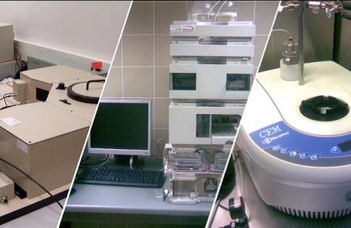
Department of Biochemistry
| head of dept.: address: room: phone: fax: web page: |
Mihály Kovács professor 1117 Budapest, Pázmány Péter sétány 1/C., 5.418. (+36-1) 381-2171; (+36-1) 372-2500 /8071 (+36-1) 381-2172 biochemistry.elte.hu |
|
Scientific discipline Biochemistry arose at the intersection of biology and chemistry, however today it is much more closely related to life sciences, and it is the most important discipline for molecular understanding of life processes. Although biochemistry in the classical sense dealt with the description of the molecular components of living systems, metabolism and bioenergetics, contrarily, today almost all biochemists at biochemistry departments and research institutes pursue molecular biology. The latter term cannot be restricted to the synthesis of information macromolecules and the processes of biological information flow, but reflects the view that research problems can be studied at the level of molecules by using molecular biology methods not only within “infra-individual biology” but in many fields of “supra-individual biology” (including taxonomy and evolutionary biology). Education The Department of Biochemistry, based on the above definition, offers lectures and practical courses in biochemistry and molecular biology in both Bachelor’s and Master’s programs in biology. We have recently initiated a new course for first year students, together with other departments, "Introduction to Laboratory Practice and Biological Calculations". The Department's educational portfolio also includes courses in biophysics and gene technology methodology as well as theoretical and practical training in protein science. Finally, we are also involved in the newly established Master's program in biotechnology and bioinformatics. Research The 50-year-old Department of Biochemistry was founded by Endre Bíró, who started his research career in Albert Szent-Györgyi’s group in Budapest. We are proud of this research lineage, and that we could follow the footsteps of the greatest Hungarian biochemist, the Nobel Prize winner Albert Szent-Györgyi. Indeed, muscle biochemistry has been for two decades the major and very successful research area of the Department, and even today, we keep studying motor proteins. Another great figure in the history of the Department, is László Gráf. He initiated the structural and functional examination of serine proteases in the mid-80s, and it is still amongst our research topics. Over the last two decades, our research portfolio has significantly expanded and diversified and basic research in protein science has been complemented with applied research, projects in drug development and biomarker studies. Our main research topics are:
Departmental life We have mostly biology, but also chemistry, biophysics, and bioengineering major students doing research at the Department. Almost all of our students participate in Students’ Scientific Association (TDK) conferences and almost every year we have prize winners. Our PhD students are have educational assignments (involved in laboratory courses as well as overseeing and evaluating undergraduate thesis work), and they report on their research progress annually in the Structural Biochemistry doctoral program associated with the Department. There are foreign students and postdoctoral fellows working at the Department, so it is place to practice the English language daily. How can I become a biochemist or protein researcher? At the Department of Biochemistry we are seeking for dedicated students who performed well in biochemistry courses, who want to follow a research career path. After graduating as biology major (or as chemist, bioengineer, biophysicist), you should apply for one of ELTE’s biology or biotechnology Master’s program. If choosing the former one, choose the Molecular, immune and microbiology or the Bioinformatics specialization. Career opportunities Getting a Master’s degree from the Department of Biochemistry (including the new Biotechnology program) will provide you good chances in getting jobs at Hungarian or foreign biotechnology or pharmaceutical firms. A PhD degree obtained at Eötvös University has a good value for postdoctoral position at almost any universities or research institutes around the world. Where can I apply for a TDK work or for a research degree? Write an email to a professor / researcher whose research topic has attracted your interest: For e-mail addresses visit: biochemistry.elte.hu/staff/teachers For more information about the Department of Biochemistry, please visit: biochemistry.elte.hu/
|

